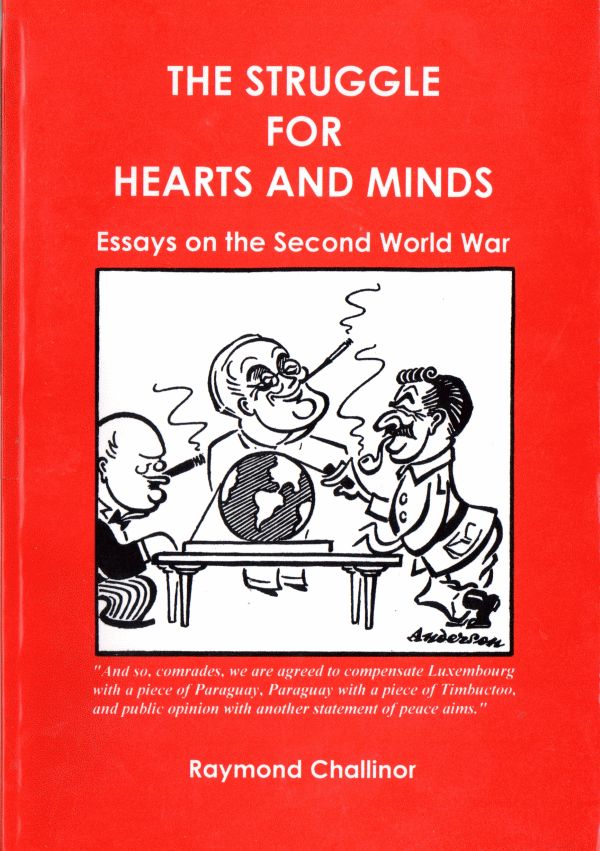
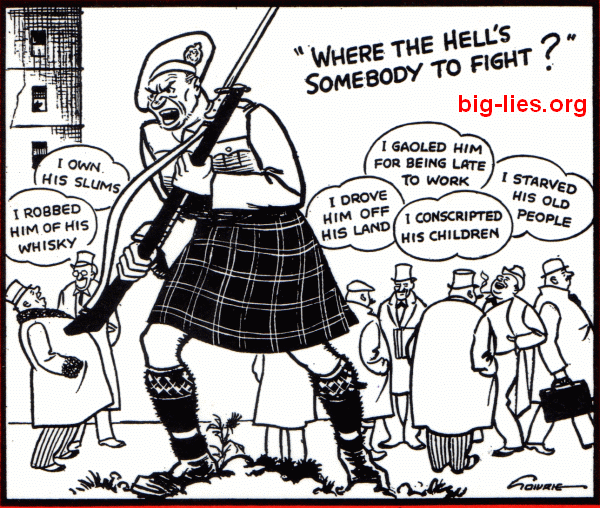 Review of Second World War essays: views from the would-be British worker representatives.
Review of Second World War essays: views from the would-be British worker representatives.Raymond Challinor: The Struggle for Hearts and Minds: Essays on the Second World War
 Self-published collection of 11 essays on hidden aspects of the Second World War, published together in 1995. Published originally in Critique, ILP [Independent Labour Party] News, International Socialist, Workers' Liberty, and Workers' Press. Review by 'Rerevisionist' February 8, 2012; more added Feb 5, 2014
Self-published collection of 11 essays on hidden aspects of the Second World War, published together in 1995. Published originally in Critique, ILP [Independent Labour Party] News, International Socialist, Workers' Liberty, and Workers' Press. Review by 'Rerevisionist' February 8, 2012; more added Feb 5, 2014
Note: Click here for my online tape of a talk by Challinor in 1998 on the Second World War. The audience reactions are typical of people who have never heard evidence against the integrity of WW2.
Note added June 23 2021: My scanned-in and optical character recognised version of Chapter 3: THE JOURNEY TO WAR is here in Word format: https://big-lies.org/reviews/challinor-raymond-essays-on-the-second-world-war-3-the-journey-to-war-notes-rae-west.pdf . It's in two halves; second half is identical, except that I've added (in red) some comments on Jews (and perhaps Freemasons) which should display the way misleading statements are assembled by Jews. It's in .pdf format to evade the endless hassles in 'Word'.
I changed my mind about Challinor; there's simply too much evidence of bias and suppression of Jewish issues, such as banking.
Smallish book, 1995, 100+ pages, paperback, unindexed; self-published by Raymond Challinor's own Bewick Press, in Whitley Bay. Printed in Lime Street, Nwcastle-upon-Tyne. Bright red cover. Challinor was a socialist in the British sense—Challinor was in the ILP (Independent Labour Party) which to some extent escaped the Labour Party's Jewish infiltration. Or at least it seemed to; I'm not certain he didn't think himself a Jew—his mother was 'of German origin', he mixed with Jews, and his attitude was anti-Nazi. He may have been just another Jew propagandist. Challinor is more or less Marxist, with e.g. emphasis on the working class vs bosses and shareholders; but he has no secret Jewish agenda and has no idea of the Jewish agenda, which are only now becoming clearer; Challinor even likes Trotsky, and quotes the mass murderer with respect. His analyses show a protesting decent-minded indignation, as far as he goes, and is unconscious of the obfuscatory tripe of the Jewish fake left.
This book's eleven chapters look at messy aspects of the war in Britain: Workers' protests and strikes; low British soldiers' pay; low seamen's pay: '.. Atlantic convoys, where ordinary seamen were ... In any naval engagement, sitting on top of their own crematorium. One torpedo, shell, or even tracer bullet could blow them to smithereens. ...'; hushed-up executions; low morale; badly built shelters; tube stations taken over as shelters against official wishes; a once-famous incident of many deaths in a steep stairway at Bethnal Green tube station (173 deaths p 60); housing damage, and squatters and rents increasing even for bombed buildings; German patent rights being respected, resulting in British tanks being inferior; children of the Rothschilds and many others shipped out,
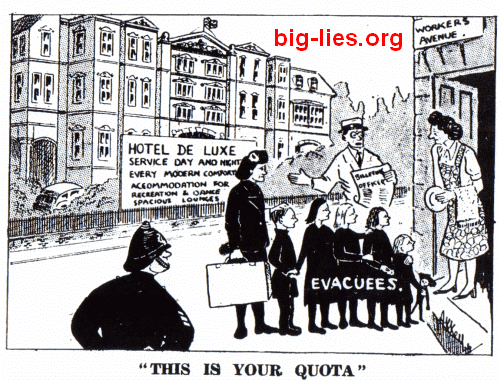 while evacuee children were seen as nuisances; shareholders' dividends from arms and motor companies clearing through Switzerland; peace movement candidates; shipping cartels reducing production, causing Jarrow to become impoverished; bombing of colonies; British agents helping Franco start the Spanish Civil War; strict media censorship; the Black Game—black propaganda; the 'Blitz' and the effects of bombs (including London's East End and Hamburg); British behaviour in the Far East; Stalin, Roosevelt and Churchill on how many million more German deaths...
while evacuee children were seen as nuisances; shareholders' dividends from arms and motor companies clearing through Switzerland; peace movement candidates; shipping cartels reducing production, causing Jarrow to become impoverished; bombing of colonies; British agents helping Franco start the Spanish Civil War; strict media censorship; the Black Game—black propaganda; the 'Blitz' and the effects of bombs (including London's East End and Hamburg); British behaviour in the Far East; Stalin, Roosevelt and Churchill on how many million more German deaths...(On Jarrow, I've adopted a revisionist view; after talking with people who lived there after the war: Jarrow is a small town between Newcastle and South Shields, of no great importance; the 'Jarrow march' was more or less a fantasy. But the Jew liars couldn't pretend there was a 'Newcastle march'. Note that there was a protest organised, or at least publicised, by a woman against deaths of children—naturally of no interest to Jewish propagandists.)
Challinor has interesting material on war events; such as French support for Russia when some Germans refused to accept the Jewish peace offer, and continued into Russia. Some of the French obstructed the Germans. Of course, Germany had supported sending Lenin into Russia in the 'sealed train', though Challinor draws a veil over what the trainload of Jews did when they arrived. Naturally, because of the overlapping multiple lies during and after the war, the stories become confusing and inconsistent, particularly when (e.g.) the opinions of Hitler are described, Hitler being of course the centre of a vortex of lies.
The seedy parts of the war—an island hospital for homosexual officers—at home, looting, prostitution and shortages, doorway sex, respectable wives and infidelity, sexual blackmail (as in Evelyn Waugh), the rage of men on returning to find what some wives had been up to, go almost unmentioned by Challinor. Alex Comfort wrote somewhere that prostitution was a 'reserved occupation' but I haven't seen this claim elsewhere. Corruption in the food rationinsg system—Jews were the principal 'spivs' ('Spiv is backslang for VIPs, Very Important Persons) helped to institutionalise corruption.
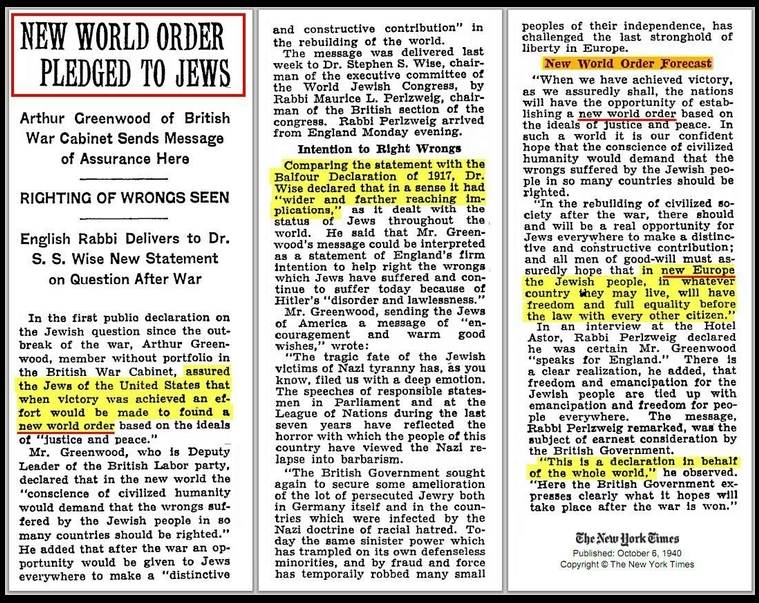
Arthur Greenwood, Amery &c were all crypto-Jews, wanting wars for Jewish gain. Challinor had no real understanding of that—or perhaps he kept it secret
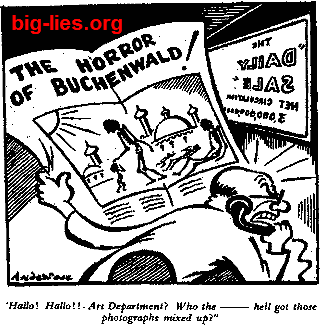
Illustrated with press cuttings, and some cartoons; the back cover shows an irate kilted Scot with a rifle, shouting "Where the hell's somebody to fight?" while top-hatted greatcoated figures in the background laugh—I robbed him of his whisky! I own his slums! I gaoled him for being late to work! I drove him off his land! I starved his old people! Another cartoon shows skeletal Indians, captioned 'The Horror of Buchenwald', and an irate editor phoning the art department—"Who the ---- hell got those photographs mixed up?"
Interesting essays, based somewhat on pamphlets and relatively rare books, plus extracts from general books and some USSR books, for example by Trotsky. The essays are undated. Challinor didn't I think know about Enigma code-breaking.
This is a reminder of what the war seemed like to newspaper readers at the time to the people in the victorious belligerent powers in Europe, who of course had an infinitely better time of it than the losers, and before the post-war straitjacket of new lies (such as the 'Cold War', 'Free World competition', the need for coloured immigration, the granting of 'freedom' to colonies (presumably mostly takeover by Jewish purchase for the (((USA))), Gulf of Tonkin, and the nuclear fraud, had been forged. Challinor doesn't realise how new 'Germany' was, after unification; what Poland was like; how Jewish lending prolonged the war and bankrupted Britain; why the myth of mass murdered Jews was invented; why the myth of nuclear weapons was made up. He thinks war 'broke out' and doesn't seem to see that Britain and France declared war together. He doesn't seem to know the word 'Blitz' was made up by British propagandists, embarrassed at German successes; it was not a German word. Maybe their word suggested collaboration.
This is partial revisionism; in the absence of full revisionism such books are needed.
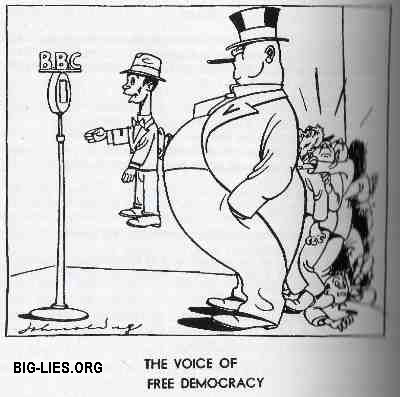 "... and so we call upon the occupied countries to rise against their oppressors—with the exception of India, of course!" - Caption from another cartoon. Note the omission of the USSR.
"... and so we call upon the occupied countries to rise against their oppressors—with the exception of India, of course!" - Caption from another cartoon. Note the omission of the USSR.Challinor on 'Conflicts' Challinor believed the war was a genuine moral battle, though he finds it hard to square this with his belief that most people aren't naturally violent: Col S L A Marshall's investigation (1943-5) on American soldiers under fire found only 15% fired their rifles—or so he claimed. We've already seen ... shareholders' dividends from arms and motor companies clearing through Switzerland ... but everyone seems to think it's normal. In fact, there's a long-standing (thousands of years?) principle on the same lines. And it's part of the evidence that the whole thing was a Jewish-orchestrated scripted fraud, along with the official toleration of supposed critical views about the war. The 'enigma' machines—(Dr Enigma, Masterman (1972) and The Ultra Secret, Winterbotham (1974)—twentyish years before Challinor's book—are subject of so much media nonsense I'd suggest they are part of the doubt over Hitler's intentions. See my unfinished How the Master Race won WW2. Of course, this needs fairly hard quantifiable evidence, from which Challinor is far remote.
Anyway—Challinor on 'the nature of conflict' has a model for wars, assumed to be between nations, plus alliances: a war effort needs three legs: armed forces, the home front, and the ruling class. If any one of these collapses, so does the war effort. Hence perhaps the title of his book, 'the battle for hearts and minds'. This of course is the propagandist gentlemanly war, far from the reality of burnt-out towns and men rounded up and shot and women used as prostitutes to get food. Challinor says confidently the Germans slaughtered far more of the allies than vice versa. This is, now, obviously false—before revelations of Dresden and other mass bombed towns and the incursion of Jewish-controlled troops from Russia. And Challinor says that 40% of British housing stock was 'destroyed or damaged'.
Well worth reading, this or similar books reveal the relatively secure funded existence of rather cowardly commentators, and their shepherds with electric prods.
Chapter 8, Arms and the Man [this is a Bernard Shaw comedy] and 9, The Enemy Within look at discontent in the British wartime forces, mainly the incompetence of military commanders, and low pay compared with ANZ men and GIs. Dunkirk and Singapore get mentions. But doubts cloud everything here. If the (((USA))) wanted to take over the Empire, their actions would not be interned to help Britain. And if the (((Jews))) controlling money and supplies were concerned with themselves—stalwart near-certainty—things are less certain than media brassy assertions suggest.
The Enemy Within does not deal with pacifists, or even pro-Germans. To the experienced eye it is Jewish activity, and the interest is in what it was trying, or pretending, to achieve. Here's an extract:
Alongside this there was a plethora of pamphlets, including one entitled The Wilhelmshaven Revolt. It gave an exciting account of the mutiny of the German navy that sparked off the German Revolution of 1918 [i.e. Jewish 'Communist' Revolution that failed]. Describing those stirring events, his message was quite simple: go and do thou likewise.
Besides the anarchists, both the ILP and Trotskyist RCP [Revolutionary Communist Party] maintained organised factions within the armed forces. The ILP Forces group, whose first secretary was Ken Eaton, followed by Cyril Hughes of Manchester, produced a regular bulletin. ... [He] stressed the importance of always striving to get soldiers and workers united in struggle. Even those who remained loyal to the capitalist system would be overwhelmingly workers. Propaganda along class lines, like Tom Mann's "Don’t Shoot" leaflet, should be directed at them. (ILP Forces’ Bulletin, May and June 1945)
Challinor I think liked the atmosphere of councils, conferences, meetings, manifestoes, movements, demonstrations, campaigns, committees, crises; and the pageant of slogans, coined as Jewish interests decided and promoted by the Jewish media—civil disobedience, new left, socialist humanism, revolutionary socialism, black and Asian rank and file, working class unity, militant section, prejudice, workers' rights, class struggle, progress, forward, the dialectic (getting old), historical materialism (ditto). All with Jewish names.
11. Challinor on the 'Cold War' His main claim is that
Challinor accepts the myth of nuclear weapons—as it invariable with Jews, who had to keep the GULags from being discovered. Obviously, without them, the weakness of the USSR, despite Jews flooding it with money, would be clear. Challinor outlines the conference at Teheran in 1944, when three Jews made the deal of 80/20 and 50/50 in Europe. He describes chaos in China and Rumania (but not Germany) in a moving way. It's impossible to know for certain if he meant it.
The notes to this chapter are a grand slam in Jews. Gabriel Kolko's The Politics of War is praised, except for his lack of 'theoretical knowledge'. He mentions Ygael Gluckstein, referred to by Challinor as Palestinian Trotskyist Tony Cliff! Whose brother in law is/was Mike Kidron. (Challinor liked 'Tony Cliff', false name and all. '... the most profound influence on my political development ... His tigerish energy, his vast knowledge, his highly individual sense of humour, and his ability to explain complicated concepts in a way that made them easily comprehensible ... these qualities he possessed to a greater degree than any other individual'. Sure thing.
Other names include Kolko, Churchill, W Bohlen, V I Lenin (=Ulyanov), W Wainwright, Henry Pelling, Vladimir Dedijer, Hal Draper, Herbert Feis, Isaac Deutscher, D Horowitz.
Rerevisionist 3rd Aug 2018